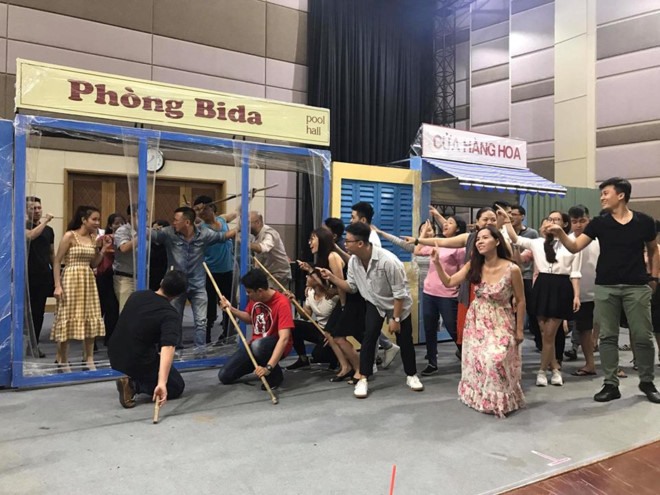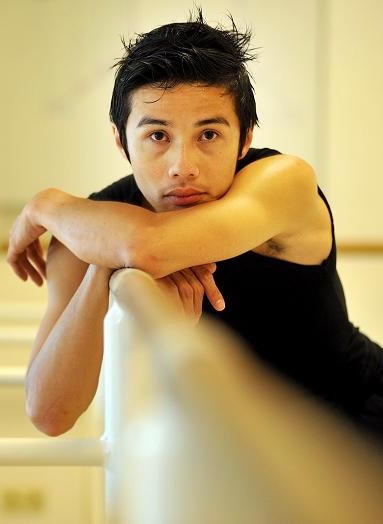 Life & Style
Life & Style

The German opera Der Freischütz was reinterpreted in Vietnamese as Nhà Thiện Xạ, and staged in July this year. The performance proved popular with audiences, especially young theatre-goers. The choreographer behind the opera, Nguyễn Phúc Hùng, who is also Chief Choreographer of the Hồ Chí Minh City Ballet Symphony Orchestra and Opera (HBSO), and his colleagues at the HBSO completed the work in co-operation with the Goethe Institute. Thành Vinh spoke to Hùng about the project and his career as a choreographer.
 |
| On stage: Artists rehearse for the opera Người Thiện Xạ. — Photos courtesy of HBSO |
The German opera Der Freischütz was reinterpreted in Vietnamese as Nhà Thiện Xạ, and staged in July. The performance proved popular with audiences, especially young ones. The choreographer behind the opera, Nguyễn Phúc Hùng, who is also Chief Choreographer of the Hồ Chí Minh City Ballet Symphony Orchestra and Opera (HBSO), and his colleagues at the HBSO completed the work in co-operation with the Goethe Institute. Thành Vinh spoke to Hùng about the project and his career as a choreographer.
Why did the HBSO choose to stage Nhà Thiện Xạ?
The opera is part of a project by the HBSO in co-operation with the Goethe Institute, which has offered both financial and human resources support. The play follows the success of two previous operas, Cây Sáo Thần (The Magic Flute) and Con Dơi (The Bat) which were popular with audiences. All three plays have been directed and supported by German director David Hermann. Some of the HBSO soloists were sent to Germany for one or two months of training to prepare for the show.
The opera had been adapted for Vietnamese culture when it was staged at the HCM City Opera House. Do you think it was a challenge for you as a choreographer?
I think it was a challenge. To get praise or recognition from the audience was really hard, whereas it might have been easier in the past. Now it has changed. I am Vietnamese and I live in Việt Nam, but I’ve also had the chance to live and work abroad so I can understand the difference in western and traditional Vietnamese culture. While working on the opera, my challenge was to find the common points where the two different cultures can meet.
In the original version, the opera tells a story of men competing for love. When it came to Việt Nam, the opera was adapted to a more modern setting. Instead of following the original of 100 years ago, we staged the opera in contemporary Việt Nam. It was a social lifestyle in which the characters are surrounded by motorbikes, street scenes and a billiards club, to make it is easier to match a Vietnamese audience’s artistic taste.
How did the audience respond to the opera, as well as to previous projects by HBSO?
The two night shows of the opera at the end of July were fully booked. That is proof that we have established loyalty with the audience, who truly love and appreciate the academic form of theatre. This is very important because it plays a significant role in the strategy for HBSO’s development.
 |
| Long career: Choreographer Nguyễn Phúc Hùng. |
Nhà Thiện Xạ is the third opera directed by David Hermann. What have you and your colleagues learnt from the German director?
David Hermann has been successful in directing these three operas including the Nhà Thiện Xạ. He is very cautious and serious when investing in directing works. Foreign directors have their own strength but they all have a very professional working attitude. That is the seriousness. I respect and appreciate that. I always ask my team to learn from that while working with them.
Did you find any differences between foreign and Vietnamese dancers?
Not at all. I think that Vietnamese dancers have good professional foundation. They just need to improve their mindset at work. Most recently, I had chance to work with director Joost Vrouenraets from Holland who was conducting a project for next year. He said he would like to select four dancers from the HBSO to join his new project. While working with him, the foreign director commented that Vietnamese dancers were no less skilled than foreign ones.
Do you share that view after 10 years working as the chief choreographer of the HBSO?
My point of view is that no one could live forever with his or her career as a dancer so if you want to maintain your job, you should always try your best on the stage in any project you work.
I always tell my team that I may not bring them money at the moment but what I ask them to learn will be their firm foundation for their future development.
For long-term development, an artist should have to keep renovating and trying at work. Chances will always come to those who want to try. The recognition from foreign directors was not only built by me, it is the joint effort of all our team.
Are you satisfied with your current work?
I think I have done well in creating a special characteristic for our group so that we are not merged with hundreds of other groups of dancers. We are very proud of our special features that we have made up on our own. I feel pleased with my own development orientation in my career but I should never be satisfied with myself in reaching my goal, maybe until I retire.
What do you think about the current living standards of Vietnamese dancers?
Now I can say that I am okay with my living conditions. I can support my family at the same time as developing my career. I always hope my children will follow my job.
As a dancer and then choreographer, I feel I am free minded and free to do what I want. I am not going to say that it is a well-paid job, but it helps me earn enough to live comfortably. One thing I want to convey is that: to get success, be true to yourself at work and follow your goal till the end. — VNS




